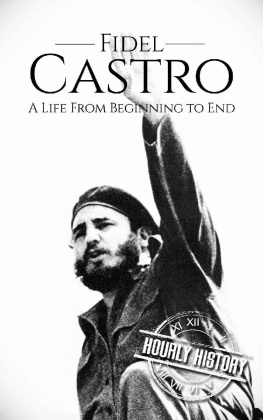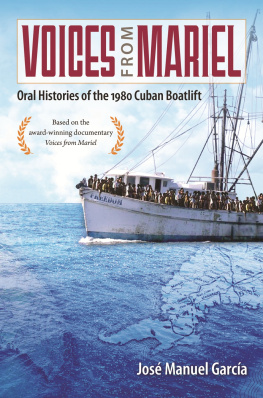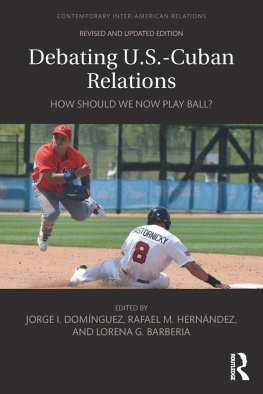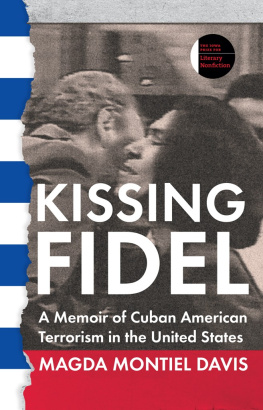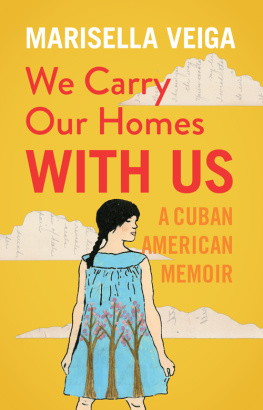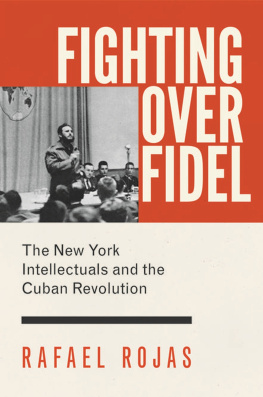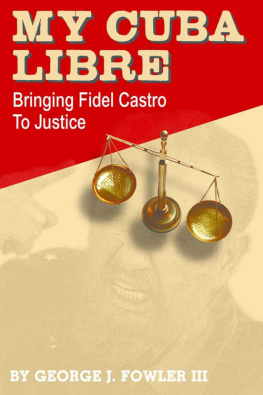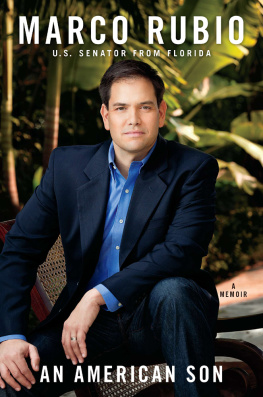A CUBAN REFUGEES JOURNEY
TO THE AMERICAN DREAM
WELL HOUSE BOOKS
A CUBAN REFUGEES
JOURNEY TO THE
AMERICAN DREAM
The Power of Education
Gerardo M. Gonzlez
Indiana University Press
This book is a publication of
Indiana University Press
Office of Scholarly Publishing
Herman B Wells Library 350
1320 East 10th Street
Bloomington, Indiana 47405 USA
iupress.indiana.edu
2018 by Gerardo M. Gonzlez
All rights reserved
No part of this book may be reproduced or utilized in any form or by any means, electronic or mechanical, including photocopying and recording, or by any information storage and retrieval system, without permission in writing from the publisher. The paper used in this publication meets the minimum requirements of the American National Standard for Information SciencesPermanence of Paper for Printed Library Materials, ANSI Z39.48-1992.
Manufactured in the United States of America
Cataloging information is available from the Library of Congress.
ISBN 978-0-253-03700-8 (hdbk.)
ISBN 978-0-253-03555-4 (pbk.)
ISBN 978-0-253-03556-1 (e-bk.)
1 2 3 4 5 23 22 21 20 19 18
To my parents
Elio Angel Gonzlez and Armantina
Gonzlez Torres
For their love and sacrifices
Contents
Acknowledgments
I GRATEFULLY ACKNOWLEDGE and thank the many wonderful people who have contributed to the preparation of this memoir. First of all, I thank my parents Elio Angel Gonzlez and Armantina Gonzlez Torres for their love, guidance, and support throughout the years. They contributed many stories and anecdotes that helped shape this book, and provided insightful perspectives on our lives as Cuban refugees and on the values I hold as a Cuban-American educator. To my sister Maritza, who helped me fill in some blanks in my memory and provided a photographic history of our family, which she meticulously organized over the years. Maritza, you have always been there for me. I love you, and many thanks.
To my wife and partner, Marjorie, who always found a way to kindly let me know when my vanity was getting in the way of my writing, and who enriched this book through her patience, devotion, and thoughtful comments: I express my love and thanks. My love and thanks also go to my children Justin, Jarrett, Ian, and Julie, who encouraged and supported me throughout this process.
To the people mentioned in this book, including Hugo Morales, Rafael Garcia, Oscar (Tommy) Pedraja, Arturo Savion, Rolando Breto, Richard Swanson, Carol Van Hartesveldt, Harold Riker, Governor Otis Bowen, Charlie Reed, Joe Wittmer, David Smith, Rod McDavis, Ken Gros Louis, and the many, many others named and unnamed, who have touched my life in so many positive ways: I say thanks.
Of course, the loving memories of my paternal grandparents Manuel Gonzlez Mndez and Encarnacin de la Cruz Soto, as well as my aunt Luisa Peralta, were never far from my thoughts while writing this memoir.
Many thanks also go to Lee Ann Sandweiss, who wrote a story about my first trip to Cuba for Bloom Magazine, and encouraged me to write a book. Her guidance and editorial assistance through the proposal preparation process were invaluable. Likewise, Im grateful to Gary Dunham, director of Indiana University Press, who also provided helpful suggestions during the early stages of writing. Special thanks also to Robert Clark, Jenny Ashton, Alan Gold and Sandra Balonyi for their terrific input and excellent editorial suggestions. Additional editorial services were provided by Jan R. Holloway, whose contributions significantly improved the manuscript and helped me put it all together. For cover design and art direction, I acknowledge the fine work of the IU Press team and Lee Griffin.
This book is a labor of love. It could not have been realized without the encouragement, support, and loving assistance of everyone named above, and many others who believed in me. My heartfelt thanks to you all.
I gratefully acknowledge the following sources for permission to reprint from previously published work:
GONZLEZ, GERARDO M. and CHARLES L. CARNEY. 2014. Challenging the Spectacle: A Case Study on Education Policy Advocacy. International Journal of Leadership and Change 2 (1): 1927. Copyright WKU College of Education and Behavioral Sciences. All rights reserved. Used by permission of Dr. Joseph P. Cangemi, editor.
SANDWEISS, LEE ANN. 2012. A Sentimental Journey. Bloom Magazine 7 (5): 114119. 20062015 Bloomington Magazine, Inc. All rights reserved. Used by permission of the author and Malcolm Abrams, publisher.
A CUBAN REFUGEES JOURNEY
TO THE AMERICAN DREAM
Prologue
H OW MANY OF us begin life not knowing who we are or where we live? How many children pass their childhood in a state of utter confusion, not able to speak the language of their neighborhood or understand the alien culture into which theyve been thrust? How many children sit in a school classroom, taunted every day and viewed as dumb by their fellow students and teachers because they cant understand a word thats being said?
Life is confusing enough for a childany childbut with the solid footing of a stable home and a family that is well integrated into society, most kids can negotiate their way through the joys of childhood and the traumas of being a teenager and build on these foundational years to become responsible adults. Given a solid home life, school, college, and the workforce can be natural progressions for many of us. We grow, we advance, and we achieve.
So what happens when a familys stable ground is suddenly ripped from under a childs feet and he feels like hes walking through quicksand? When he sees his father and mother not as successful adults but living in constant fear? What goes through his mind when he is forced to remain mute, day after day, year after year, because he is afraid if he speaks, his teachers will discipline him? When he becomes stuck, because his teachers interpret his silence as bad behavior?
These were the issues I faced as a boy of eleven. I was once a bright and happy child. But when my family relocated to a strange and forbidding society, I couldnt speak or understand those around me. I was forced to conform to the standards of a society I simply couldnt comprehend.
My name is Gerardo Gonzlez. I am a Cuban refugee who arrived in the United States shortly after Fidel Castro came to power. We fled a regime we wanted no part of, whose economics and ideology we distrusted. But in the United States my father, mother, sister, and I suffered dislocation, isolation, and fear. Todays immigrants and refugees, in the main, face even more daunting challenges. Regardless of their reasons for fleeing and the traumas they suffer, all who find themselves stateless face common experiences.
This is my story, but its also the story of all immigrants who have had to leave their homes out of fear and desperation. We share a constant fear of authority in everything we do. We feel isolated when we see people our own age, born in our host nation, walking freely along the pavement. We feel were here under sufferance.
If the world is to survive todays refugee and migrant crisis, we have to remember what happened at the beginning of the last century, along the pathways etched into the fertile soil of a young America. We have to remember the time when people and governments saw refugees, migrants, and immigrants not as an unwelcome invasion or a drain on society but as a resource that, when nurtured, would become societys most valuable assetits citizens.


